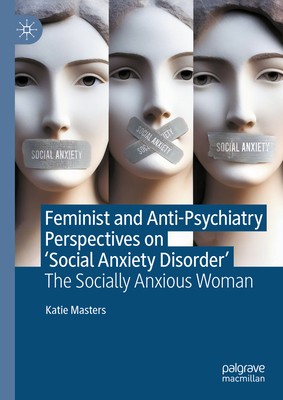
- We will send in 10–14 business days.
- Author: Katie Masters
- Publisher: Palgrave Macmillan
- ISBN-10: 3031487060
- ISBN-13: 9783031487064
- Format: 14.5 x 20.1 x 2 cm, hardcover
- Language: English
- SAVE -10% with code: EXTRA
Feminist and Anti-Psychiatry Perspectives on 'Social Anxiety Disorder' (e-book) (used book) | bookbook.eu
Reviews
Description
Can the diagnosis 'Social Anxiety Disorder' (SAD) in women be understood as a rational response to life in postfeminist, neoliberal, twenty-first century Britain? By speaking to women with this diagnosis, and drawing on the author's own lived experience, this book investigates the interplay between women's social anxiety and Western culture. It argues that societal factors are implicated in women's mental distress to a far greater extent than dominant (especially psychiatric) narratives would hold -- narratives which, premised on individual pathology, often present a biologically reductionist and medicalised account. Through deploying a unique blend of feminism and anti-psychiatry, this book critiques the framework which exists around diagnosing and treating SAD, but without dismissing distress. Inspired by feminist critiques of other gendered psychiatric diagnoses, such as Anorexia Nervosa, it conceptualises 'SAD' -- which appears to be more prevalent in women -- as a 'culture-bound syndrome'.
This book develops feminist scholarship which has explored women's socialisation and gendered power relations: from the requirement to emulate beauty ideals and embody contradictory imperatives of femininity, to the newer, social media-fuelled pressure to present the 'best version of oneself'. Laying bare these exigent demands, and their associated 'no-win' situations, women's self-surveillance and concern with being evaluated negatively -- both of which exemplify SAD -- are, in the spirit of antipsychiatry, rendered comprehensible.
This book will be of tremendous utility for those with interests in gender studies and sociology.EXTRA 10 % discount with code: EXTRA
The promotion ends in 20d.16:48:35
The discount code is valid when purchasing from 10 €. Discounts do not stack.
- Author: Katie Masters
- Publisher: Palgrave Macmillan
- ISBN-10: 3031487060
- ISBN-13: 9783031487064
- Format: 14.5 x 20.1 x 2 cm, hardcover
- Language: English English
Can the diagnosis 'Social Anxiety Disorder' (SAD) in women be understood as a rational response to life in postfeminist, neoliberal, twenty-first century Britain? By speaking to women with this diagnosis, and drawing on the author's own lived experience, this book investigates the interplay between women's social anxiety and Western culture. It argues that societal factors are implicated in women's mental distress to a far greater extent than dominant (especially psychiatric) narratives would hold -- narratives which, premised on individual pathology, often present a biologically reductionist and medicalised account. Through deploying a unique blend of feminism and anti-psychiatry, this book critiques the framework which exists around diagnosing and treating SAD, but without dismissing distress. Inspired by feminist critiques of other gendered psychiatric diagnoses, such as Anorexia Nervosa, it conceptualises 'SAD' -- which appears to be more prevalent in women -- as a 'culture-bound syndrome'.
This book develops feminist scholarship which has explored women's socialisation and gendered power relations: from the requirement to emulate beauty ideals and embody contradictory imperatives of femininity, to the newer, social media-fuelled pressure to present the 'best version of oneself'. Laying bare these exigent demands, and their associated 'no-win' situations, women's self-surveillance and concern with being evaluated negatively -- both of which exemplify SAD -- are, in the spirit of antipsychiatry, rendered comprehensible.
This book will be of tremendous utility for those with interests in gender studies and sociology.

Reviews